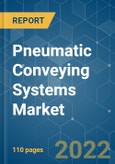The pneumatic conveying systems market is expected to grow at a CAGR of around 2.5% during the forecast period. Factors such as rapid industrialization in emerging economies and growing demand for industrial material handling equipment are expected to drive the market across the world. However, due to the outbreak of COVID-19, slow down, or delay of manufacturing projects are likely to hinder the market growth during the forecast period.
Key Highlights
- With significant global capital spending expected to come in the pharmaceutical and chemical industries, it is expected that the chemical industry is likely to witness significant growth during the forecast period.
- The government of the United Arab Emirates (UAE) is concentrating on having a higher share of the manufacturing sector in its country’s GDP. With its shrinking prospects for investment in the oil & gas industry, the country is planning to diversify its business to other business segments, such as manufacturing. For instance, the Abu Dhabi Economic Vision 2030 aims to grow the non-oil sector by more than 7.5% annually to help the UAE achieve a neutral non-oil trade balance. This move is expected to create an opportunity for the pneumatic conveying systems market in the near future.
- Asia-Pacific is likely to dominate the market during the forecast period, with the majority of the demand coming from China, and India.
Key Market Trends
Chemical Sector to Witness Significant Growth
- The chemical sector is one of the prominent segments that utilize pneumatic conveying systems to transfer chemicals through an enclosed conveying pipeline from one or more sources to one or more destinations. Air and pressure difference are used inside the pipeline as a transferring medium.
- The sector primarily uses dilute phase pneumatic conveying systems that maintain an air velocity of around 3200 to 8000 feet per minute and a positive or negative pressure of approximately 5 to 12 pound per square in gauge (PSIG) or 4 to 12 Hg for continuous of chemicals within a facility.
- In 2018, world chemical sales grew by nearly 5.2%, as compared to 2008. With chemical sales of around EUR 3.34 trillion in 2018, it is expected to have increase sales on account of the growing demand for chemicals in various sectors like fertilizer and pharmaceutical.
- Regarding capital expenditure, the sector has spent EUR 193.1 billion in 2018, which grew by nearly 5.9%, as compared to 2008. China is one of the major countries that has contributed to almost 45% of the global investment in 2018.
- On account of COVID-19, the slowdown of manufacturing units occurred all around the world, for which chemical market like the United States is expected to squeeze its chemical production capacity in 2020.
- On the other hand, an excess requirement of medicines to tackle COVID-19 has boosted the pharmaceutical sector in 2020 and is likely to grow positively during the upcoming years. Chemicals such as hydrochloric acid are primarily used in pharmaceutical industries to manufacture active pharmaceutical ingredients (API). Thus, increasing uses of hydrochloric acid in pharmaceutical companies is likely to have a positive impact on the chemical sector and would help in the growth of the market during the forecast period.
Asia-Pacific to Dominate the Market
- Asia-Pacific is one of the prominent regions that have a large number of industries in various sectors. China is one of the major countries in the region, which is considered to be the largest manufacturing hub in the world, contributing nearly 28.4% of global manufacturing output.
- Chemical, pharmaceutical, plastic are a few significant segments in the region that use pneumatic conveying systems to flow its materials from one location to the other.
- China is the largest chemical producer in the world. From contributing 23.6% of the global chemical sales in 2009 to nearly 35.8% in 2018, China has expanded its chemical business exponentially during the last nine years, which supported the pneumatic conveyor systems to grow in the market.
- China, along with other countries of the region, has sold nearly EUR 1.9 trillion of the chemical during 2018. It is expected to increase in sales during the upcoming years because of the increasing demand for compounds primarily in plastic and pharmaceutical companies.
- Apart from chemical, China is one of the largest producers of plastic materials globally, accounting for nearly 30% of the global plastics production. The demand and production of plastic products have increased in China since 2017, which has supported the growth of plastic manufacturing units of the country.
- With its increasing population, countries like China and India are expected to have a huge demand for chemicals, medicines, plastic, and food & beverage industries during the upcoming years. An increase in demand is likely to increase investment in the aforementioned sectors and would thereby increase the market of pneumatic converting systems during the forecast period.
Competitive Landscape
The pneumatic conveying systems market is fragmented. Some of the key players in the market include Atlas Copco AB, Coperion GmbH, Cyclonaire Corporation, Palamatic Process, Dynamic Air Inc., Flexicon Corporation, Gericke AG, DongYang P & F, Nilfisk Group, and Schenck Process Holding GmbH.
Additional Benefits:
- The market estimate (ME) sheet in Excel format
- 3 months of analyst support
This product will be delivered within 2 business days.
Table of Contents
Methodology

LOADING...








